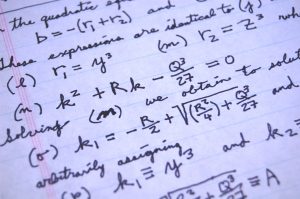
MATHEMATICS
Exam Board: Edexcel
Course Contact: Mr. H. VIRDI
What will I study?
The Mathematics course is split into two main elements; Core Mathematics and Applied Mathematics. Challenging but interesting, Mathematics builds on the work you have met at GCSE but also involves new concepts that some of the greatest minds of the last millennium have discovered.
Mathematics serves as very useful support for many other qualifications, as well as being a sought after qualification for the workplace and courses in Higher Education.
Mathematics serves as very useful support for many other qualifications, as well as being a sought after qualification for the workplace and courses in Higher Education.
At Oak Heights we follow the Edexcel course. Mathematics at AS and A level is divided into three branches:
Core Mathematics
When studying core mathematics at AS and A level you will be extending your knowledge of such topics as algebra and trigonometry as well as learning some brand new ideas such as calculus. If you enjoyed the challenge of problem solving at GCSE then you should find the prospect of this course very appealing.
When you study statistics you will learn how to analyse and summarise numerical data in order to arrive at conclusions about it. You will extend the range of probability problems that you studied for GCSE by using the new mathematical techniques studied in the core mathematics units of the course. Many of the ideas you will meet in this course have applications in a wide area of other fields, from assessing what your car insurance is going to cost, to how likely the earth is going to be hit by a comet in the next few years.
Mechanics
When you study mechanics you will learn how to describe mathematically the motion of objects and how they respond to forces acting upon them, from cars in the street to satellites revolving around the planet. You will learn the technique of mathematical modelling; that is, of turning a complicated physical problem into a simpler one that can be analysed and solved using mathematical methods.
At AS, you will study Core 1, Core 2 and either Statistics 1 or mechanics 1. For A2, you will study Core 3, Core 4 and either Mechanics 1 or Statistics 1. All of the courses have equal weighting and each is assessed by a Terminal 90 minute exam. In both years all modules are examined during the Summer Examinations.
Further Mathematics may be offered to students who demonstrate the desire and ability to cope with the demands of the course.
What will you need to study this course?
To study Mathematics A Level, you will need 5 or more A*-C grades at GCSE, or equivalent, including at least a grade B in Mathematics GCSE. The compulsory core modules develop your algebraic skills; consolidating and extending work with quadratic equations and higher order polynomials, extending work with sequences and graphs, expanding uses of trigonometry and introducing calculus techniques. The optional applied modules offer a variety of practical applications of Mathematics. The Statistics modules explore data manipulation and interpretation; calculating measures of average and dispersion, quantifying correlation, working with probabilities and introducing probability distributions.
Students will sit Maths as an AS and an A2 with public exams at the end of both year 12 and 13.
What next?
Maths is probably the most marketable A Level in terms of acceptability. It is difficult to think of any degree course/career where it would not be welcomed in combination with other subjects.
Mathematics is the queen of sciences and arithmetic is the queen of mathematics.
Johann Carl Friedrich Gauß
Due to the content of the course, Mathematics is a good accompaniment to AS/A Levels in Physics, Chemistry, Psychology, ICT and Geography. The statistical techniques are used to evaluate data collected during Biology, Psychology and Geography field work. The algebraic work, which is the basis of the Core modules, is fundamental in the analysis of Chemical structures of chemistry. Logarithms are used in modelling behavior and populations in Physics, Biology and Geography.
Mathematics A Level is usually a prerequisite for degree courses including: Mathematics, Physics, Chemistry, Economics, Pharmacology, Engineering, Computer Science, Medicine, Psychology and Optometry.
Entry requirements:
Students should have a minimum grade of an A/B in GCSE or IGCSE Mathematics.
